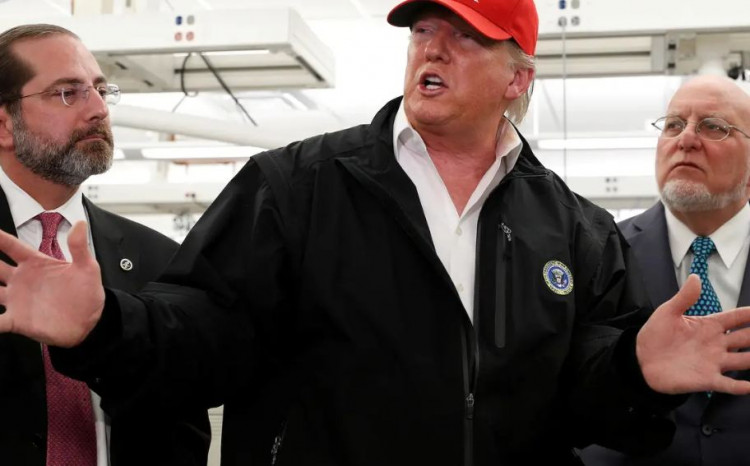Republicans are blasting as foolhardy, short-sighted and a blatant re-election gimmick President Donald Trump's hasty proposal for a $40 billion payroll tax cut while bailing out industries hard hit by the COVID-19 outbreak as moves guaranteed to add billions of dollars to the massive U.S. budget deficit.
The U.S. national debt now stands at $23.3 trillion while the U.S. the federal budget deficit has ballooned to $1.06 trillion on account of the Republican Party's ill-advised tax cuts to the rich and to corporations enshrined in the 2017 Jobs and Tax Cuts Law. Government revenues also plummeted because of the reduced tax intake triggered by the law.
Trump met with Senate Republicans Tuesday afternoon to gain support for his payroll tax as part of an economic stimulus package, which he announced to the surprise of his advisers. GOP senators rebuffed Trump and right-wing media outlets said Trump "emerged from the meeting with no consensus."
Senate Republicans were lukewarm to Trump's spur-of-the-moment decision to offer a payroll tax cut and spend billions of taxpayer dollars to rescue the distressed cruise ship and airline industry but without any commensurate cuts in federal spending.
Sources in the Senate affirmed there was no consensus reached during Trump's talk with Senate Republicans. The fact a multitude of other options to see the economy through the economic crisis ignited by COVID-19 were discussed but no plan was agreed upon reflects the deep GOP opposition to Trump's proposals.
"It's probably something I wouldn't do," said Sen. Mike Braun (R-IN) to CNN.
GOP senators were especially upset at Trump's proposal for a permanent payroll tax cut and the reasons advanced for it, which is to put more money into people's pockets.
The right-wing newspaper, The Washington Examiner, dismissed this proposal as nothing but a Trump re-election gimmick.
"It's not clear that a big stimulus package or bailout is warranted by the economic situation, and there's little to suggest a payroll tax cut would improve matters noticeably beyond perhaps juicing the stock market in the short-term" said the op-ed. "President Trump needs to do what's right for the country and its fiscal future -- not what he thinks might best boost his odds for reelection."
The Examiner again slammed this proposal as a reelection stunt. It wrote Trump's $40 billion per month temporary payroll tax cut "is a blunt, crude tool ill-suited as a public policy response for this situation. Trump just wants to juice up the stock market before Election Day, rather than pursue serious policymaking that can actually help the root cause of the economic disruption: the spread of the COVID-19 virus."
The newspaper argued Trump's payroll tax cut is too broad and doesn't target those directly affected by the coronavirus outbreak. It correctly pointed ut workers only benefit from a payroll tax cut if they still have jobs. On the other hand, employees in retail and travel that are laid off permanently or temporarily won't be helped much at all by a payroll tax cut.
GOP senators also remained cool to Trump's idea of a temporary payroll cut lasting several months. Trump suggested he wouldn't want the tax cut to expire before the November election to help his reelection bid. Trump told the Republican senators he'd get credit from voters for the payroll tax cut.






